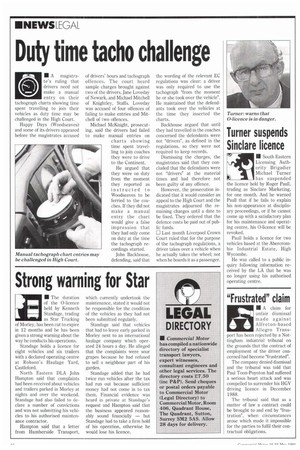Duty time tacho challenge
Page 18

If you've noticed an error in this article please click here to report it so we can fix it.
• A magistrate's ruling that drivers need not make a manual entry on their tachograph charts showing time spent travelling to join their vehicles as duty time may be challenged in the High Court.
Happy Days (Woodseaves) and some of its drivers appeared before the magistrates accused of drivers' hours and tachograph offences. The court heard sample charges brought against two of the drivers, Jane Loveday of Newark, and Michael Mitchell of Knightley, Staffs. Loveday was accused of four offences of failing to make entries and Mitchell of two offences.
Michael McKnight, prosecuting, said the drivers had failed to make manual entries on charts showing time spent travelling to join coaches they were to drive to the Continent.
He argued that they were on duty from the moment they reported as instructed to Woodseaves to be ferried to the coaches. lf they did not make a manual entry the chart would give a false impression that they had only come on duty at the time the tachograph recordings started.
John Backhouse, defending, said that the wording of the relevant EC regulations was clear: a driver was only required to use the tachograph "from the moment he or she took over the vehicle". He maintained that the defendants took over the vehicles at the time they inserted the charts.
Backhouse argued that until they had travelled in the coaches concerned the defendants were not "drivers", as defined in the regulations, so they were not required to keep records.
Dismissing the charges, the magistrates said that they concluded that the defendants were not "drivers" at the material times and had therefore not been guilty of any offence.
However, the prosecution indicated that it would consider an appeal to the High Court and the magistrates adjourned the remaining charges until a date to be fixed. They ordered that the defence costs be paid out of public funds.
1:1Last month Liverpool Crown Court ruled that for the purpose of the tachograph regulations, a driver takes over a vehicle when he actually takes the wheel; not when he boards it as a passenger.


















































































